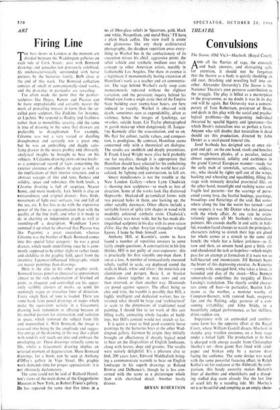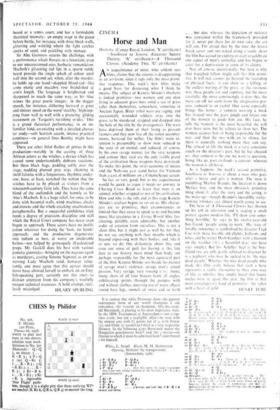THEATRE
Convulsions
The Storm. (Old Vic.)—Macbeth. (Royal Court).
AHD all the flurries of rage, the crosstalk and back answers, and distracting yells for attention, it should not be forgotten that the theatre as a body is quietly shedding an old coat, thrashing and wrestling half into an- other. Alexander Ostrovsky's The Storm is the National Theatre's own perverse contribution to the struggle. The play is billed as a masterpiece in the programme, as no doubt it was in its day and will be again. But Ostrovsky was a contem- porary of Tom Robertson, precursor of Ibsen, and deals in this play with the social and psycho- logical problems—the burgeoning individual thwarted by squalid bigotry and ignorance—for which Ibsen's naturalism was so perfect a form. Anyone who still doubts that naturalism is dead should see this production, directed by John Dexter as a snail-paced funeral rite.
Josef Svoboda has designed sets at once ele- gant and apt : on the one hand, stools and benches and rough-hewn planks, of a peculiar, indeed almost supernatural, solidity and earthiness in the grand Central European manner—ready for the surly mob of townsfolk, servants, soldiers, etc., who should by rights spill out of the wings, hacking and wheezing and squabbling, filling the stage with minutely detailed provincial life; on the other hand, moonlight and rushing water and fragile leaf patterns—for the soarings of perse- cuted young love, the fearful bodings, yearnings, broodings and flutterings of the soul. But some- where along the line the worm has turned—and one suspects it was Mr Dexter who lost patience with the whole affair. At any rate he osten- tatiously ignores all Mr Svoboda's meticulous pointers. His crowds shuffle in and settle in bale- ful, wooden-faced clumps to watch the principals; characters itching to stretch their legs are glued for whole scenes at a stretch to the same old bench; the whole has a listless jerkiness—as if, now and then, an unseen hand gave a brisk stir and abandoned the task as hopeless—which might pass for an attempt at formalism if it were not so half-hearted and inconsistent. Jill Bennett bears the brunt of this depressing exercise. As Katerina —young wife, uncaged bird, who takes a lover, is hounded and dies of the shock—Miss Bennett remorselessly underlines the turgidity of Doris Lessing's translation. The sheerly sordid charac- ters come off best—in particular, Beatrix Leh- mann as the mother, a monster worthy of Compton-Burnett, with ramrod back, snapping lips and the flicking, edgy gestures of a con- suming irritability; and John Stride, in a beautifully judged performance, as her shiftless, drink-sodden son.
Impatience with an outmoded and cumber- some form has the opposite effect at the Royal Court, where William Gaskill directs Macbeth in sketchy grey woollen costumes on a bare stage under a naked light. The production at its best is charged with energy caught from Christopher Morley's set—three gaunt flats lined with sand- paper and broken only by a narrow door facing the audience. The same device was used, with the same powerful focusing effect, in Ralph Koltai's set for endgame at the Aldwych; by com- parison, this heady austerity makes- Beckett's litter of dustbins and wheelchairs and a droop- ing stuffed dog seem already like the last line of scurf left by a receding tide. Mr. Morley's set is as beautiful and tempting as an empty chess-
board or a tennis court, and has a formidable theatrical intensity: an empty stage in the pause before battle, for instance, with three bleak walls, glittering and winking where the light catches specks of sand, and prickling with menace.
Sir Alec Guinness returns the challenge, with a performance which flowers in a luxuriant, even to our unaccustomed eyes, barbaric romanticism. Macbeth's glistening red lips in a sparse sandy beard provide the single splash of colour until well into the second act, when, after the murder, he holds up one hand—dappled blood-red—like some exotic and macabre rose brandished at arm's length. The language is heightened and sharpened in much the same way, as Sir Alec mimes the great poetic images: in the dagger speech, for instance, slithering forward at great and sinister speed on the word 'stealthy,' highstep- ping from wall to wall with a prancing. gliding movement on `Tarquin's ravishing strides.' This is a grand rhetorical performance, in an un- familiar kind, co-existing with a detailed charac- ter study—soft Scottish accent, intense practical canniness—on general lines. Bentley might have approved.
There are other fitful flashes of genius in this production—notably in the casting of three African actors as the witches, a device which has caused some understandably dubious reactions. But these black hags, padding softly over the stage, nodding plumed grey wigs. chanting in shrill falsetto with a languorous, rhythmic under- tow, have, at least, scotched the notion that the witches have to be played as visitors from a nineteenth-century fairy tale. They have the same blend of the outlandish and the homely as Sir Alec's Macbeth. It is a huge relief, for once, to be done with baronial walls, wind machines, cloaks and crowns and the whole creaking anachronistic paraphernalia. But a successful confidence trick needs a degree of precision, discipline and skill which the Royal Court company has never even begun to approach. These actors have no justifi- cation whatever for doing the 'look, no hands' approach; and the production degenerates into tedium at best, at worst an intolerable bathos—not helped by grotesquely ill-calculated props. Mr. Gaskill does his best with various panicky gimmicks—bringing on the negroes again as murderers, casting Simone Signoret as an un- nerving Lady Macbeth (and, however reluc- tantly, one must agree that this actress should never have allowed herself to embark on an Eng- lish-speaking part; certainly not this one)—to distract attention from his company's woefully meagre technical resources. A bold attempt, reck-







































 Previous page
Previous page